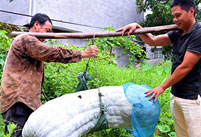 Vintage cars show kicks off in London
Vintage cars show kicks off in London
 Gorgeous scenery in NE China
Gorgeous scenery in NE China
 Picturesque Barkol grassland in Xinjiang
Picturesque Barkol grassland in Xinjiang
 Small Wild Goose Pagoda - A World Cultural Heritage Site along the Silk Road
Small Wild Goose Pagoda - A World Cultural Heritage Site along the Silk Road
 Maritime Silk Road Luxuries of the Han Dynasty
Maritime Silk Road Luxuries of the Han Dynasty
 Ciao! Chinese beauties!
Ciao! Chinese beauties!
 An eye feast: BFA freshmen registration
An eye feast: BFA freshmen registration
 Top 10 most lavish weddings
Top 10 most lavish weddings
 Most amazing chi-pao beauties
Most amazing chi-pao beauties
 Chinese lingerie brand arrives in Las Vegas
Chinese lingerie brand arrives in Las Vegas
Zhejiang province and Shanghai both announced new plans for the gaokao, the national college entrance exam, on Friday in the hope of improving the quality of education by allowing their high school students to learn a wider breadth of subjects.
Both the city and the province said the annual gaokao will no longer be the only criterion for college admission and that students will not be forced to choose a preference in majors from either liberal arts or sciences.
In the newly announced pilot programs, both regions will do away with the former gaokao system in which 12th-graders took tests on six subjects in just three days. In most regions, the gaokao can only be taken once a year.
With the changes, students will still be tested on Chinese, math and English. But for the three remaining subjects, students in Shanghai and Zhejiang can choose to be tested on a wider range of topics from geography, history, chemistry, biology, physics and politics, among others.
The students can also take examinations on subjects other than math and Chinese twice between the 11th and 12th grades and submit the highest score on their college applications.
Liu Xiping, director of the Zhejiang provincial education department, said at a news conference on Friday that the new plan is to reduce the burden of the exams by splitting them into different periods.
Dai Xiaoping, an expert with the Zhejiang Research Institute of Education Science, said the reform will improve the quality of high school education over the long run.
"Currently, 12th-graders' last year in high school is extremely stressful because of the gaokao. They have to work very hard on at least six subjects during that year. With the reform, they can distribute what they study into different periods, which will help them better learn each subject," she said.
But Gan Yiwen, an eighth-grader in Hangzhou, Zhejiang, said she is afraid that her entire senior high school years will be crammed with exams.
"Now they (high school students) only have to work hard for one year to prepare for the final exam. I don't want a miserable high school life," she said.
Liu, with the provincial education department, said measures will be adopted to ensure that high schools do not arrange their curricula only for exams.
"The ultimate goal of the reform is to improve the quality of the education. Students are the first concern with this plan," he said.
Lyu Jia, a teacher at Hangzhou Yuanqing High School, said rearranging curricula will be a challenge for high schools.
"Since students will choose different subjects, dealing with how to put them into class units is a challenge. For teachers, balancing classes according to tests is another challenge. We are still working on these issues," she said.
Liu said that after the rform colleges will have a more diverse body of students to choose from.
The reform will begin this year for 10th-graders in Shanghai and Zhejiang.
 Giant white gourd weighing 87 kilograms appears in SE China
Giant white gourd weighing 87 kilograms appears in SE China Advanced arms help to safeguard China-ASEAN Expo
Advanced arms help to safeguard China-ASEAN Expo Leading director Wang Quan'an detained for 'buying sex'
Leading director Wang Quan'an detained for 'buying sex' Heaven on earth: Dongjiang Lake in Hunan
Heaven on earth: Dongjiang Lake in Hunan Mixed reaction to smartphone sidewalk
Mixed reaction to smartphone sidewalk 'Rainbow running' race in Jiangxi
'Rainbow running' race in Jiangxi Amazing aerial photos of China's Xisha Islands
Amazing aerial photos of China's Xisha Islands Beautiful postgraduate teaches in remote area
Beautiful postgraduate teaches in remote area Top 10 world's highest-paid models 2014
Top 10 world's highest-paid models 2014 Lingerie show at 2014 Miss China
Lingerie show at 2014 Miss China Songstress Li Xianglan dies at 94
Songstress Li Xianglan dies at 94 Police recruiting posters
Police recruiting posters Anshun Daxi- Living fossil of Chinese drama
Anshun Daxi- Living fossil of Chinese drama Urban farmers in China
Urban farmers in China 'Firepower-2014 Weibei'military exercise
'Firepower-2014 Weibei'military exerciseDay|Week|Month